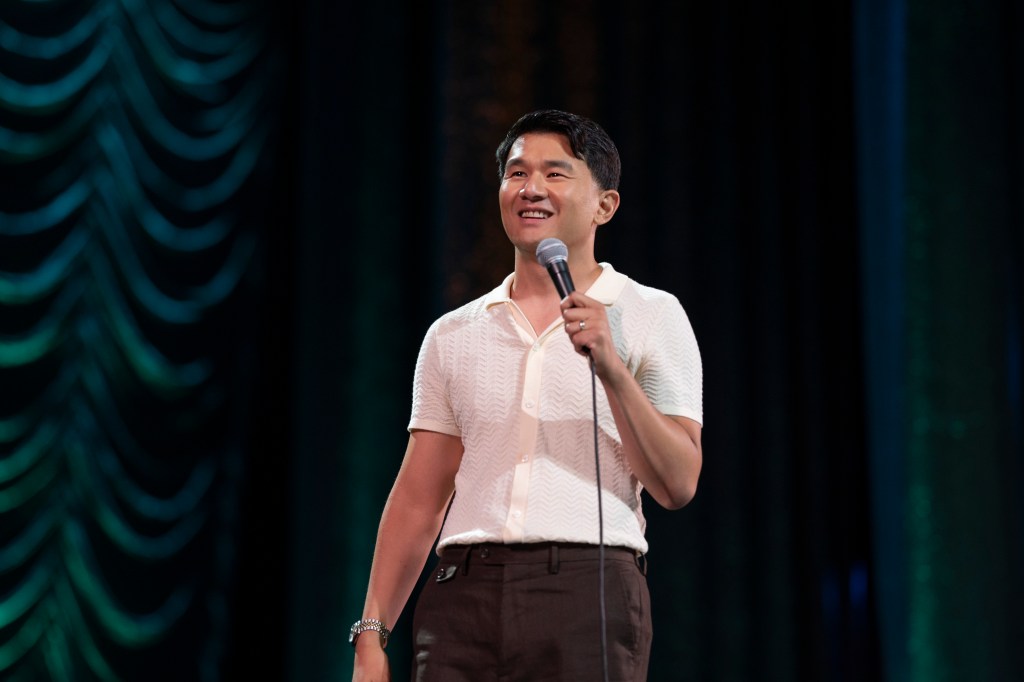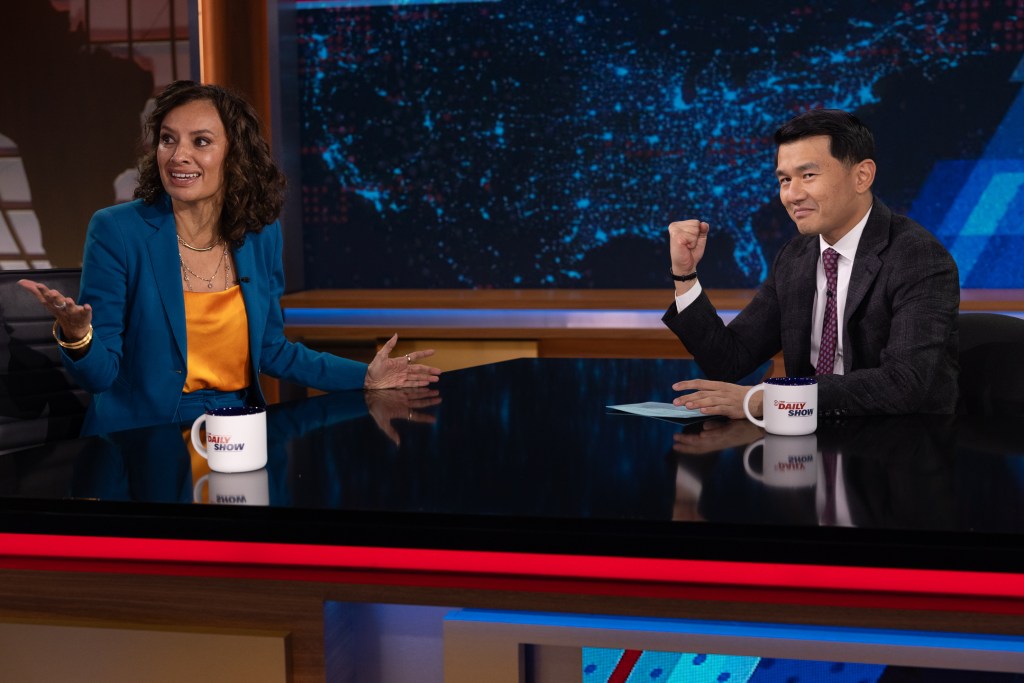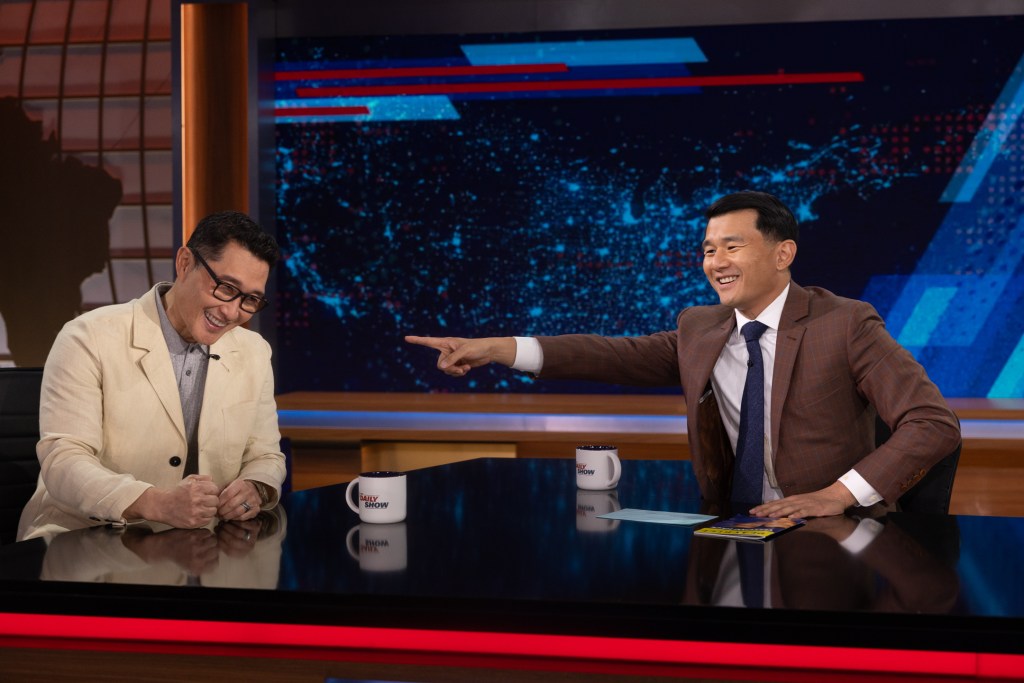Ronny Chieng Doesn’t Want The Daily Show to Be Your Only News Source: ‘I Wouldn’t Like That’
Pro tip for Ronny Chieng fans—if you meet him in person, don’t say that you only get your news from The Daily Show… even if that happens to be true.
“I wouldn’t like that,” the senior correspondent for Comedy Central’s longtime satirical newscast tells TVNewser when asked how he’d feel about being someone’s sole news source. “Not at all. I hope you’re reading other stuff!”
For the record, it’s not that Chieng doesn’t value being part of a late night comedy institution that holds other institutions to account. Since joining The Daily Show in 2015 under previous host Trevor Noah, the Malaysian actor and comedian has filed viral reports taking on Fox News, the Metaverse, and the Space Force. And when Jon Stewart returned to the anchor’s chair on a one-night-a-week basis earlier this year, Chieng became one of several rotating hosts who get to sound off on the biggest stories of the day from behind the TDS desk.
“My guiding light is that I want to make fun of institutions,” he explains. “I think of comedy as counterpunching; we should be at the back of the room making fun of people in decision-making positions when they’re acting silly.”
What Chieng expressly wants to avoid, though, is becoming an institution himself—a voice that people look to for wisdom and guidance through an increasingly fragmented news ecosystem. Personalities like Joe Rogan and Greg Gutfeld have followed the comedy-to-commentator path to great success in recent years, becoming celebrated figureheads in conservative news spaces in the same way that Al Fraken and Stewart were previously embraced as progressive champions. (Although Stewart—like Chieng—continues to insist that he’s a comedian first.)
“I don’t think a comedian’s goal should be trying to lead society,” Chieng says. “Occasionally, you’ll make a good point or you’ll feel very strongly about something and that’s fine. But I don’t think you can try be a leader or a journalist and still claim to just be doing comedy. Speaking for myself, when I’m on The Daily Show I’m trying to do comedy.”
And he’s succeeding. Besides The Daily Show, Chieng can currently be seen in the acclaimed Hulu series Interior Chinatown and just dropped his latest comedy special, Love to Hate It, on Netflix. We discussed how he got interested in American politics while growing up in Singapore, how he navigates Asian American stereotypes in Hollywood, and the first time he met Stewart after he landed The Daily Show gig.
[This interview has been edited and condensed for clarity]

Like you, I grew up overseas—mostly in Asia—and it was always interesting to read about America from afar. What were some of the sources you remember getting your news from?
This was all pre-internet in the ’90s so we got Time and Newsweek, and our TV news would be from Channel News Asia. We didn’t have cable so we didn’t get CNN International or anything like that. Compared to Singapore or Malaysia, American politics seemed much more dramatic and the stakes felt a bit higher, even though it was lower for me personally. There was a showmanship around it and around American news that was always very engaging.
And then that showmanship led me to American TV and movies like The West Wing and Die Hard. Die Hard really seemed like American politics in a way. The Americans in that movie don’t know how to relate to these smooth European criminals, so they act in a way that’s analogous to how Americans would act in any kind of political situation. If you liked Die Hard, you’d naturally be drawn to a country where people behaved that way.
I guess what I’m saying is that American pop culture would naturally push to be interested in American politics! [Laughs]
One of the bits in your Netflix special that I really enjoyed was where you ranked Asian countries by fun factor with South Korea currently on top. I lived in Hong Kong in the early ’90s and it felt like the center of the pop culture universe then.
Yeah, you were in peak Hong Kong! The idea of ranking Asian countries isn’t new, but ranking them according to how fun they are probably is.
Do you expect Singapore to ever get cool in the same way?
Probably not Singapore, no. I don’t know how it happens, but it’s one of those intangible cultural things where there’s not really a math-like equation. You can only feel it in the moment in terms of who’s making the coolest stuff. Right now, South Korea undoubtedly is kind of dominating, and Japan has its moments. Hong Kong was at the top once, and then they kind of fell off a little bit. I don’t know if it comes in cycles, but I do know it’s something that every country is trying to do, but few actually can. It’s hard to artificially manufacture coolness and culture and all that.

There’s another bit in your Netflix special where you talk about how young American men are specifically susceptible to the YouTube algorithm that can feed them extremist content. Is that something that you think is unique to this country?
No, I think it impacts everybody. If you are a man on the internet in the English-language sphere, it definitely influences you. The Chinese internet might be a little different, but they have their own toxicity. I do know for a fact that you could be in Singapore and fall into the same kind of toxic online circles that that American men do. I’m not saying Asia has their own equivalents, I’m saying they literally watch the American incel toxicity.
Do you have any early memories of seeing Asia portrayed in American media and whether you felt those depictions were accurate?
When I lived in New Hampshire, we never heard about Malaysia once. [Chieng lived in Manchester, NH from 1989 to 1994] I remember saying I was from Malaysia, and people didn’t even know what that was. So we weren’t portrayed at all.
That ties into Interior Chinatown, which satirizes how Asian Americans are presented in pop culture. What often gets missed by Hollywood is that Asian cultures aren’t monolithic, and those differences are rarely explored.
Yeah, in America, “Asian American” is not just its own voting block, but it’s also its own lens to view Asia from.
Is it ever frustrating to be thought of as belonging to a cultural monolith instead of an individual country?
No, not really. I mean, I kind of came here knowing the deal, and I’m honestly surprised when people can tell the difference. I do think Americans are now starting to see those differences a little bit. If you talk to anyone who is connected to pop culture right now—even in the smallest way—I think they understand that, say, Parasite is a Korean movie, and not a Japanese movie; Japan is a different country. But I didn’t come here with an expectation that they would know that.
Does that ever factor into the parts you choose to play as an actor? Would you not accept the role of a Japanese character, for example?
No, I took a role as a Korean guy recently in Vacation Friends 2. If the director thinks I can pull it off and I think I can pull it off, then I don’t really mind. Acting is part of the job. That being said, it’s not like I can convincingly speak native Japanese, so it’s understandable if I don’t get a job because of that.
I ask that partly because there’s a larger conversation happening in Hollywood right now about whether actors from a certain background should play characters with a different lived experience.
Yeah, I get it. It’s an issue. I do think that [acting] is an art form, so I don’t think there’s any hard and fast rules. A lot of it’s just vibe and context as well as the overall project’s mission statement, and who else is playing what in that movie.

Let’s talk Daily Show—you joined well before Jon Stewart returned to the program. What was your first meeting with him like?
I had met him years ago at the Comedy Cellar when I first took the job, and he had just left. I remember telling him, “I’m such a big fan of yours and I’m a new correspondent on The Daily Show.” And he said, “Oh yeah, I’ve heard good things about that show.” [Laughs]
He was always very friendly to me outside of The Daily Show, but I didn’t know he was going to come back this year. The day you found out is the same day I found out! But it’s been great. He’s such an approachable sounding board for ideas, and he created the format for modern American satire. So it’s cool to learn from him and see how he does it. When I have creative questions, structural questions, or just very technical questions, he’s always available. He also trusts us to make our own stuff and say what we want to say.
It’s funny to me that he’s never covered a Trump campaign—or a Trump administration—until this year. Since you covered Trump’s first term, did you have any pointers for him?
Oh no, not at all. He doesn’t need pointers from me, for sure! But honestly, it’s not that hard to figure out how to cover Trump, unfortunately. That news dominates the headlines, which I don’t think is a good thing. He’ll say something that’s relevant to the American people in the news, and then you’re kind of forced to talk about it or you’re forced to make fun of the coverage of him. So you don’t really need to study too hard to figure out how to cover Trump.
In an interview with Fresh Air recently, you indicated you weren’t concerned about making fun of Trump since The Daily Show was unaffected during his first administration. This week, we’ve seen ABC News settle a defamation suit and Trump has also sued a pollster affiliated with The Des Moines Register. Do those developments have you feeling differently?
I don’t feel differently, but in that interview I did say that I reserve the right to change my mind after he takes office. I still believe in the rule of law in America, so I don’t think he’s targeting journalist per se. But I’m also not a journalist, so I don’t feel the same way about it. I mean, I do wonder if he’ll come after comedians next! I don’t know.
We were speaking earlier about how some comedians are embracing their roles as journalists or thought leaders. Do you think that has to do with audiences wanting to hear direct opinions instead of nuanced reporting?
I think part of it is that hot takes make clicks, so people are just trying to become hot take machines and not really doing journalism. And another part of it is that spoken mediums make information easier to disseminate than written mediums. Unfortunately, when you write something, people have to take the effort to read it, and it’s easier to listen to someone talk than having to read an article.
And then some of it also is that people want to hear news filtered through opinions that agree with them. If you’re looking for things that agree with your sensibilities that becomes information siloing, and then you don’t hear enough alternative opinions. Obviously it’s multifactorial, but I think those are some of the reasons that news is becoming a bit like two guys slouching on a sofa with a microphone just talking.
That’s what a news show often is now, you know what I mean? To me, it feels very lazy.
https://www.adweek.com/tvnewser/ronny-chieng-the-daily-show-interior-chinatown-netflix/